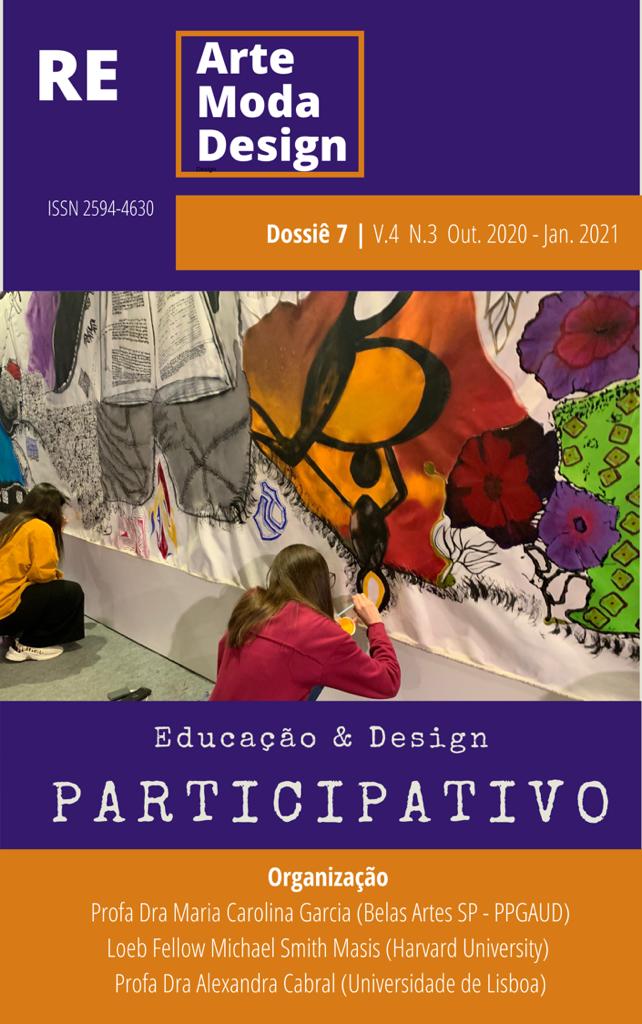Co-design com Prática Sustentável no Ensino de Design de Moda
DOI:
https://doi.org/10.5965/25944630432020093Palavras-chave:
co-desing , sustentabilidade , hackingResumo
The issue of sustainability is presented today as one of the main challenges facing hypermodern society. Fashion designers and educators have the opportunity to adopt a fashion design paradigm, which departs from the classic structures of fast fashion and can guide them towards a new concept of ethical and sustainable fashion. From this approach it is possible to work with design, manufacturing and consumption criteria; but also reactivate the longevity of the garments, improving the user experience and the consideration of fashion waste. Our research is based on the concept of slow fashion and the application of co-design methods in classrooms, to encourage the development of sustainable practices and new collaborative methods in education, involving designers, researchers, craftsmen and different social groups and non-governmental organizations in the generation and development process. The qualitative methodological view was approached from the practice of participatory design in offline communities, where various design strategies for sustainability were implemented, such as; piracy, decoding and recoding techniques for second-hand clothing, all based on criteria of optimization and quality improvement of the garments. The sample included 30 participants divided into 5 groups, whose members adopted different roles and actions within the groups. Various data collection instruments were also used that measured awareness levels and sustainable positive impacts on workshop participants.
Downloads
Referências
BIRTWISTLE, Grete.; MOORE,C.M Fashion Clothing-where does it all end up? International Journal of Retail Distribution Management, V. 35, n. 3, p. 210-216, 2007. Disponível em: https://www.emerald.com/insight/content/doi/10.1108/09590550710735068/full/html?src=recsys&
BLACK, Sandy. Eco-Chic: The Fashion Paradox. London: Black Dog Publishing, 2008.
CHEN,H.; BURNS,L. Environmental analysis of textile products. Clothing and Textile Research Journal. V.24, n. 3, p. 249-261, 2006. Disponível em: https://doi.org/10.1177/0887302X06293065
FAUD-LUKE, Alastair. Eco Design: The Sourcebook. London: Thames & Hudson, 2002.
FIORE, A.M.; LEE.S.; KUNZ, G.; CAMPBELL, J. R. Relation between optimum stimulation level and willingness to use mass customization options. Journal of Fashion Marketing and Management. V.5, n.2, p.99-107, 2001. Disponível em: https://doi.org/10.1108/EUM0000000007281
FLETCHER, Kate. Sustainable Fashion and Textile: Design Journeys. Earthscan. London: Sterling. 2008
FLETCHER, Kate. Slow fashion: an invitation for system change. Fashion Practice: The Journal of Design, Creative Process & the Fashion.V. 4, n. 2, p. 259-266, 2010. Disponível em: https://doi.org/10.2752/175693810X12774625387594
FLETCHER, Kate. Durability fashion, sustainability: The processes and practice use. Fashion Practice: The Journal of Design, Creative Process & the Fashion. V. 4, n. 2, p. 221-238, 2012. Disponível em: https://doi.org/10.2752/175693812X13403765252389
FLETCHER, K.; GROSSE, L. Fashion and Sustainability: design for change. London: Laurence King, 2012.
GALLOWAY, A., BRUCKER-COHEN, J.; GAYE, L.; GOODMAN, E.; HILL, D. Design for hackability. ACM. p. 363-366. ACM. 2004. Trabalho apresentado no 5th conference on Designing interactive systems: processes, practices, methods, and techniques.
ElSASSER, V. Textiles: Concepts and Principles. 3rd ed. New York: Fairchild, 2011.
PILLER, F.; SCHUBERT, P.; KOCH, M.; MÖSLEIN, K. Overcoming mass confusion: collaborative customer Co-Design in online communities. Journal of Computer- Mediated Communication, V.10, n. 4, p.00-00, 2005. Disponível em:
https://doi.org/10.1111/j.1083-6101.2005.tb00271.x
PINE, J. Mass Customization. Boston, MA: Harvard Business School Press. 1993.
POOKULANGARA, S.; SHEPHARD, A. Slow fashion movement: understanding consumer perceptions- an exploratory study. Journal of Retailing & Consumer Service, V. 20, p. 200-206, 2013. Disponível em https://doi.org/10.1016/j.jretconser.2012.12.002
SANDERS, E. B- N.; STAPPERS, P. J.Co-creation and the new landscape of design, Co-Design: International Journal of Co-Creation in Design and the Arts, V. 4, n. 1, p.5-18, 2008. Disponível em: https://doi.org/10.1080/15710880701875068
SANDERS, Elizabeth. B.-N. Design research. Design research quarterly, V. 1, n. 1, p.1-8, 2006a. Copenhagen, University of Art and Design
SANDERS, Elizabeth. B.-N Design serving people. Trabalho apresentado no Cumulus Working Papers, 2006, p. 28-33. Copenhagen, University of Art and Design.
SANDERS, Elizabeth. B.-N An evolving map of design practice and design research. Interactions, V. 15, n. 6, p. 13-17, 2008. Disponível em:http://grcd3021-f18.studiojunglecat.com/wpcontent/uploads/2018/08/LizSanders_AnEvolvingMapOfDesignPracticeAndDesignResearch.pdf
ULRICH, Pamela V.; ANDERSON‐CONNELL, Lenda Jo.; WU, Weifang. Consumer co‐design of apparel for mass customization. Journal of Fashion Marketing and Management: An International Journal, V. 7, n. 4, p. 398-412, 2003. Disponível em:
https://doi.org/10.1108/13612020310496985
VON BUSCH, O. Engaged design and the practice of fashion hacking: the examples of Giana Gonzalez and Dale Sko. Fashion Practice The Journal of Design, Creative Process & the Fashion, V. 1, n. 2, p. 163-185, 2009. Disponível em: https://doi.org/10.2752/175693809X469148
WU, Juanjuan. Co-design communities online: Turning public creativity into wearable and sellable fashions. Fashion Practice : The Journal of Design, Creative Process & the Fashion [online] V. 2, n. 1, p. 85-104, 2010. Disponível em: https://doi.org/10.2752/175693810X12640026716474
Downloads
Publicado
Versões
- 01-10-2020 (2)
- 02-10-2020 (1)
Como Citar
Edição
Seção
Licença
Copyright (c) 2020 Desamparados Pardo Cuenca

Este trabalho está licenciado sob uma licença Creative Commons Attribution 4.0 International License.
- Autores mantém os direitos autorais e concedem à revista o direito de primeira publicação, com o trabalho simultaneamente licenciado sob a Licença Creative Commons Attribution 4.0 Internacional, que permite:
1. Compartilhar — copiar e redistribuir o material em qualquer suporte ou formato para qualquer fim, mesmo que comercial.
2. Adaptar — remixar, transformar, e criar a partir do material para qualquer fim, mesmo que comercial.
O licenciante não pode revogar estes direitos desde que você respeite os termos da licença.De acordo com os termos seguintes:
1. Atribuição — Você deve dar o crédito apropriado, prover um link para a licença e indicar se mudanças foram feitas . Você deve fazê-lo em qualquer circunstância razoável, mas de nenhuma maneira que sugira que o licenciante apoia você ou o seu uso.
2. Sem restrições adicionais — Você não pode aplicar termos jurídicos ou medidas de caráter tecnológico que restrinjam legalmente outros de fazerem algo que a licença permita -
Plágio, em todas as suas formas, constitui um comportamento antiético de publicação e é inaceitável. Esta revista utiliza o software iThenticate de controle de similaridade.






